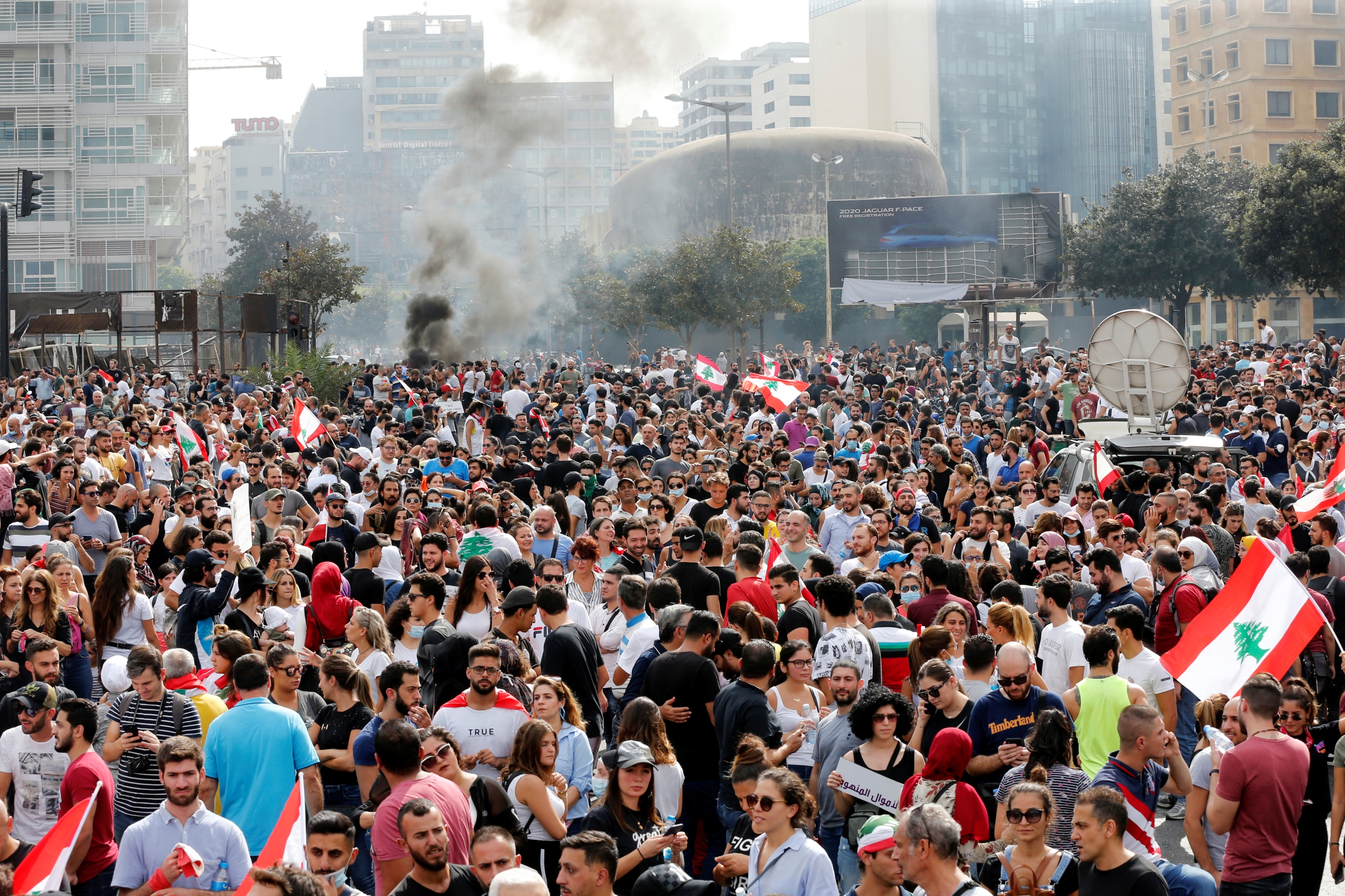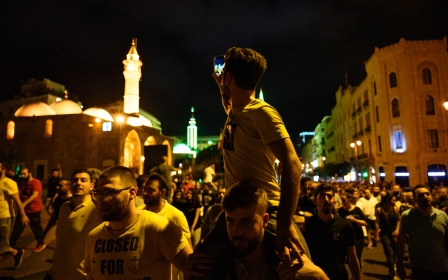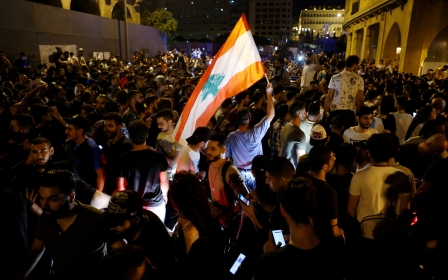Economy, WhatsApp, wildfires: Why are there protests in Lebanon?

Anti-government protests across Lebanon continued for a second day on Friday, as demonstrators expressed their anger over the deep economic crisis and rampant state corruption plaguing the country.
A decision on Thursday to impose taxes on calls made on applications like WhatsApp appeared to be the last straw for many citizens, who felt the government's proposed solutions to the crisis were inefficient and would only hurt ordinary people further.
Even though the government had since backtracked on its proposal for the new tax following public outcry, tens of thousands of people still staged protests across the country on Friday, proving that their anger goes far deeper than the so-called WhatsApp tax.
So why are the Lebanese people taking to the streets?
Economic crisis
New MEE newsletter: Jerusalem Dispatch
Sign up to get the latest insights and analysis on Israel-Palestine, alongside Turkey Unpacked and other MEE newsletters
Lebanon's economy has been hit by repeated political deadlocks in recent years. Government finances are strained by a bloated public sector, debt-servicing costs and subsidising the state power producer.
Fitch ratings agency recently downgraded the country's sovereign debt, which stands at $86bn - more than 150 percent of gross domestic product - deep into junk territory.
On 2 September Lebanon declared a state of economic emergency, vowing to speed up public finance reforms in an acknowledgement of the financial situation afflicting the country.
But the government's recent proposal of austerity measures and tax increase has angered citizens who accuse politicians of corruption, theft and leaving them behind with rising unemployment.
The crisis has caused the unofficial exchange rate to rise to 1,600 Lebanese lira for one US dollar, almost 100 lira over the officially pegged exchange rate of LL 1,507.5.
WhatsApp tax
As the Lebanese government looked to increase revenues in its 2020 budget, it decided on Wednesday to charge citizens $0.20 per day for making voice calls using online applications such as WhatsApp and Viber.
The move would have charged users $6 per month on top of already hefty telecoms bills. Lebanon has some of the highest mobile network prices in the world.
Adding to the country's list of problems - longstanding environmental crises, water and electricity shortages, crumbling infrastructure and lack of state services - is Lebanon's extremely unequal distribution of riches.
According to Lebanese newspaper Al-Akhbar, the 1 percent wealthiest people in the country own 58 percent of Lebanon’s wealth - while the poorest 50 percent own less than 1 percent.
In a country infamous for being a fiscal haven for the ultra-rich, imposing taxes on technology used by all parts of society is a bitter pill to swallow.
Wildfires
Earlier this week, more than 100 forest fires broke out out across Lebanon, and the government came under heavy criticism for being unprepared to deal with the situation.
Citizens questioned why three of the country's emergency helicopters had not received maintenance work since they were purchased in 2009 at a cost of $13.9m.
"The country is in a deficit. There is no money in the treasury - there is no money to do maintenance," an interior ministry source told local newspaper The Daily Star.
Instead of firefighting helicopters, Lebanese army helicopters and civil defence teams were deployed to fight the blaze, while Cyprus, Jordan and Greece sent planes to assist.
The civil defence was forced to borrow riot control vehicles mounted with water cannons to battle the fires in the Chouf area.
The move was not well received by the Lebanese public, who criticised the government for keeping these vehicles in top condition to use against citizens during protests, instead of ensuring that life-saving equipment such as firefighting helicopters stay operational.
Bread, fuel and medicine
Economic anxiety has worsened recently with the slipping of Lebanese lira pegged to the US dollar.
Banks are trying to keep whatever supply of US dollars they have, as Lebanese nationals and residents struggle to withdraw the currency from their bank accounts.
Lebanese millers, who import wheat in US dollars, warned last month that wheat stocks had fallen to a dangerous level and that the country might face a supply crisis unless dollars were supplied at the official rate.
The problem with supplying flour to bakeries at the official Lebanese pound price was that the conversion from Lebanese pounds to US dollars had become very costly, the millers' association said.
This led millers to issue invoices in dollars, thus forcing the increased exchange rate on bakeries, which, as a result went on strike last week.
Bakery owners suspended their strike after Prime Minister Saad Hariri promised them in a meeting to resolve the issue.
It is not just the millers who are feeling the burn. Fuel distributors went on strike last month because the shortage of dollars at the official exchange rate was forcing them to pay more at money exchange points.
The pharmaceutical sector has also recently threatened to take unspecified steps if the dollar payment crisis is not settled.
Middle East Eye delivers independent and unrivalled coverage and analysis of the Middle East, North Africa and beyond. To learn more about republishing this content and the associated fees, please fill out this form. More about MEE can be found here.




